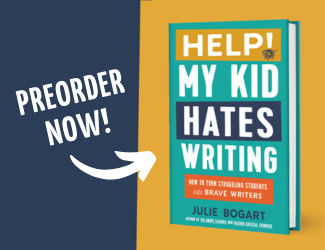Brave Writer spotlight: Tom
 The following fragment poem was inspired by a Daily Writing Tip (see below).
The following fragment poem was inspired by a Daily Writing Tip (see below).
Minecraft
by Tom (age 13)
As zombies gather.
Blocky and cubular*.
While I craft.
When I build.
Awaiting me.
*Cubular: to have a very cubeish nature; to be cubey.
Also, for the few who may not know what Minecraft is: “Minecraft is a game about breaking and placing blocks. At first, people built structures to protect against nocturnal monsters, but as the game grew players worked together to create wonderful, imaginative things.” ~from the official website
Image by crdotx
Here’s the Daily Writing Tip:
Fragments of thought.
The difference between a fragment and a complete sentence dogs many would-be writers. Student writers are notorious for treating a dependent clause as a complete sentence. The reason for this habit is that kids write according to what they hear in their heads. They occasionally put a period at the end of a thought, then have an additional thought, and so begin it with a capital letter, only to get to the end of that thought and instead have simply added a clause to the original. The problem is that they don’t notice it as a fragment because it does feel like it stands alone in that moment. They read the sentences and fragments all together and it flows, in their heads.
The only way to help them edit to discover fragments is to give them experience creating them (to have to create a fragment without any other sentence to prop it up). That practice can, then, help them find their fragments in their writing.
Try this: Make a fragment poem.
Pick a theme or topic:
Snow
Now write fragments all down the page that go with snow (no complete sentences allowed). Some words lend themselves to fragment writing:
Which, Because, As, That, While, When, Such as, For example, Like.
Also, gerunds (the ‘ing’ form of verbs) often start fragments too!
Let’s try our fragment poem using some of those fragment starters.
“Snow” by Julie Bogart
Snow
Which is white and cold.
That comes in winter.
Because the sky freezes.
As clouds cluster.
While we sit beside warm fires and knit scarves.
For example: knit one, purl two, red, blue, blue.
When flakes float.
Like lily lace.
And they drift.
Gathering behind firelight and flashing needles.
If you read each individual line, it’s clear that it is hanging there, fragmented, not quite anchored to anything but the original idea. In writing prose, fragments depend, usually, on a preceding sentence to make original sense. By getting familiar with how a fragment is constructed, you can then edit with an eye to those warning signs! If you see “While” capitalized, you have to ask yourself whether that capitalization is justified. Does it lead to a complete sentence or hang off the ledge of the previous one? Edit accordingly.
I hope you’ll send me your fragment poems. They are fun to write!


















[…] we highlighted a student’s fragmented poem based on a Daily Writing Tip and the building game, Minecraft. One of our lovely instructors, […]